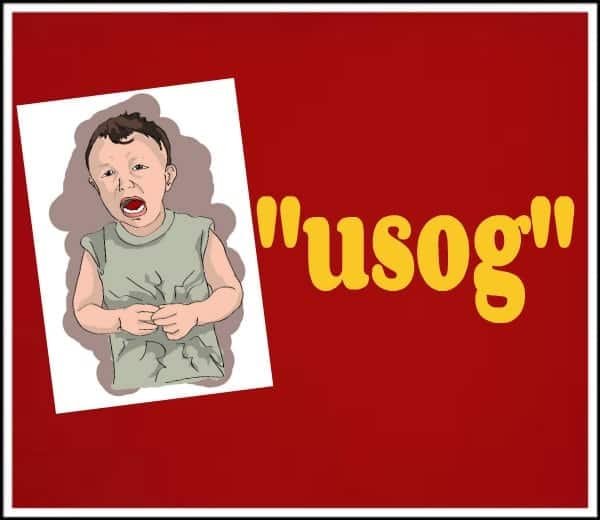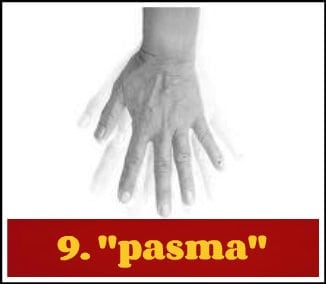30 Filipino Words With No English Equivalent

We Pinoys have words for everything.
Somebody who butts in somebody’s business to get attention is called epal, short for pumapapel. We feel bitin when we run out of rice in the middle of eating. And nawiwindang is how we feel after seeing Yolanda’s aftermath: it’s shocking, unbelievable, unexpected and hard to wrap your mind around (Yes, we got all that in one word).
Also Read: 16 Colors And Their Beautiful Names In The Philippine Language
Hell, we’re so creative we have words that defy exact translation into English.
We’ve compiled thirty such words. While they’ll make sense to Pinoys and baffle foreigners, they’re entertaining just the same.
So brush up on your lolo and lola’s vocabulary (as most of these words found use during their era) and get your henyo caps on; we’re exploring untranslatable Filipino words.
Bangungot

“Wag kang matulog ng busog kung ayaw mong mamatay sa bangungot!
Nope, it doesn’t translate to nightmare. A nightmare is a very bad dream and doesn’t cause death, so that’s not an accurate description of our bangungot. It’s like this: going to bed + full stomach + bad dreams = never waking up (death).
Scientists call it acute hemorrhagic pancreatitis but that doesn’t explain the paralysis or the bad dreams. Some call it Sudden Unexpected Death During Sleep (SUDS) but what’s interesting is, this phenomenon was first described in a 1917 medical literature from the Philippines.
Our lolos and lolas knew what they were talking about, after all.
Kilig
“Kilig na kilig ako nung hinawakan nya ‘ko sa kamay.”
While its earlier form was mixed with borrowed English words to read kilig to the bones, we’ve come to accept kilig as a standalone word.
It could mean trembling in English, but not quite. See, what trembling doesn’t describe is the excitement and the romantic feeling that comes with kilig.
It’s like this: I’m on cloud 9 + I’m so happy I could burst + I’m so electrified I can’t think straight = kilig. And even these words couldn’t adequately explain how kilig truly feels.
Also Read: How To Say “Hello” In Tagalog
Pitik

“Pipitikin ko yang tenga mo pag ‘di ka sumunod sa inuutos ko!”
Pitik could either mean flip, flick or snap by using the fingers. However, the word could also mean something that isn’t confined to what the fingers can do.
“Pumitik ‘yung ilaw” (flicker) and “Nawala cellphone ni Tonyo, may pumitik yata” (stole) are two very different uses for the word pitik.
The varied use of the word makes it impossible to assign an exact meaning in English to it. Meanwhile, it takes on the meaning we Pinoys want at our convenience. Not bad for a word we’ve come to associate with pain in our childhood.
Usog

“Nausog ng ale ‘yung anak ko, nagsuka tuloy at nilagnat.”
It doesn’t matter whether you think the child in question is cute or not. If you’re new to that place and some kid gets sick after you leave, you have hexed the child by usog (also known as balis).
And now you have to put some of your saliva on the kid’s forehead, tummy and feet while saying the words “pwera usog” over and over again. Only then will you have appeased the parents, cured the grossed out child and be allowed to leave.
This usually happens when your presence overpowers a susceptible child (and adults, occasionally). Talk about coming on too strong.
Tampo
“Nagtatampo ako dahil hindi mo naalala ang anniversary natin.”
You’re not really angry. But you’re not happy either. And you feel slighted! All those emotions rolled into one would read: tampo.
How we thought up the word is ingenious. No English word can sufficiently translate this one, and there is no Western equivalent.
Pissed off is too extreme. Disappointed is close, but not quite. It doesn’t even come close to sulking, although silent treatment is a symptom. Try all of that with a dash of sweetness. And that’s the closest translation you’ll probably get.
Basta
“Basta sundin mo na lang ang inutos ko sa’yo, tapos!
Although this word may have Spanish origins from ¡basta ya! Which means “enough already!” it doesn’t quite cover it.
When Pinoys say basta, it’s definitive. What was said before basta was uttered is final, valid and true. It is said with the kind of insistence that cannot be challenged or argued upon.
When our nanays declared basta, we were expected to obey meekly and accept that wisdom without question, even when she said that aswangs have preference for naughty kids. She always just knew.
Try This: FilipiKnow’s Ultimate Tagalog-English Dictionary
Gigil

“Ang kyut ng bata, nakakagigil!”
Some have cleverly defined this as an urge to pinch or squeeze something that is irresistibly cute and that’s pretty much it.
However, we also use it in another context: “Nanggigigil ako sa kapitbahay naming napakaingay” . Put this way, it hardly means irresistibly cute; you’re closer to clobbering the neighbor than actually pinching cheeks.
Gigil, therefore, is subjective. It’s an uncontrollable urge to pinch or squeeze somebody or something, but it’s not always because of cuteness. You’ve been warned. [Image source: Reuel Mark Delez]
Pagpag
“Pagpag mo muna ang twalya at baka may langgam.”
Alright, it could mean shake or dust off, but pagpag requires a bit more rigor than that.
What we often imagine when we hear the word pagpag is holding the object and repeatedly hitting a surface with it to make dirt, dust or something come off the object. Unfortunately, this is the same description which made pagpag synonymous to scavenged food.
Thus, pagpag could also mean the food collected from our local version of dumpster diving. Disheartening, but true.
Pasma
“Wag ka munang humawak ng tubig pagkatapos mong magplantsa at baka mapasma ka!”
I was already in college when I learned that the word pasma isn’t even a medical phenomenon. It can’t be translated to English because it doesn’t exist, or so experts say.
But our lolas would beg to differ. Pasma could either manifest by tremors, numbness or abdominal pain and is brought about by immediate exposure to cold water after a vigorous activity (which warms the body). Therefore body heat + cold water = pasma.
The origin of the word could be the Spanish espasmo which means spasm, although our plasma has come to mean much more than that.
Lihi
“Ang hilig mo sa mangga, para kang naglilihi.”
Although experts limit paglilihi as pregnancy sickness, we define it as something more than that.
Lihi is when a pregnant woman in her first trimester causes her husband hell. She throws up in the mornings. She’s constantly moody and irritated. She craves the most impossible food to get a-hold of at 2AM. And worse, she could take a liking to something unattractive, causing her unborn child to look like whatever took her fancy during pregnancy.
If she liked KeroKeroKeroppi while she was naglilihi, her baby would look like a frog. Bizarre, I know, but still widely believed in our culture. [Image source: MedObserver]
Read More:
FilipiKnow
FilipiKnow strives to ensure each article published on this website is as accurate and reliable as possible. We invite you, our reader, to take part in our mission to provide free, high-quality information for every Juan. If you think this article needs improvement, or if you have suggestions on how we can better achieve our goals, let us know by sending a message to admin at filipiknow dot net
Copyright Notice
All materials contained on this site are protected by the Republic of the Philippines copyright law and may not be reproduced, distributed, transmitted, displayed, published, or broadcast without the prior written permission of filipiknow.net or in the case of third party materials, the owner of that content. You may not alter or remove any trademark, copyright, or other notice from copies of the content. Be warned that we have already reported and helped terminate several websites and YouTube channels for blatantly stealing our content. If you wish to use filipiknow.net content for commercial purposes, such as for content syndication, etc., please contact us at legal(at)filipiknow(dot)net





